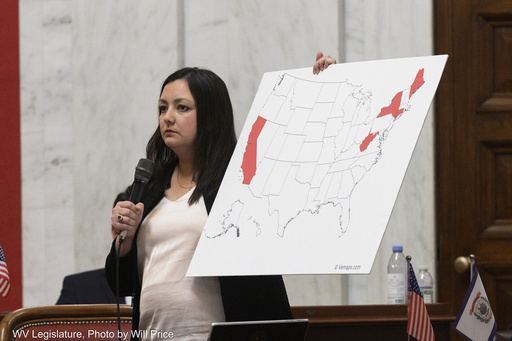CHARLESTON, W.Va. — A significant change to vaccination policies in West Virginia is on the horizon as state senators have voted to eliminate one of the strictest school vaccination policies in the United States. This legislative move introduces an exemption for families who assert that mandatory vaccinations clash with their religious or philosophical beliefs.
If the bill gains approval in the House, it is anticipated that Republican Governor Patrick Morrisey will promptly sign it into law. Morrisey has made the allowance of religious exemptions a priority during his time in office. Remarkably, West Virginia currently stands alone among a limited number of states in the U.S. that permits only medical exemptions for vaccinations, a policy that has been praised by health experts for its protective nature regarding children’s health.
Proponents of the bill argue that refusal to permit exemptions is unconstitutional and infringes upon the educational rights of children. Republican Senator Laura Wakim Chapman expressed her support on the Senate floor, stating, “Education is a fundamental right. We have no business trampling on a child’s religious beliefs for a fundamental right to have an education.” As the Chair of the Senate’s Health and Human Resources, Wakim Chapman displayed a poster showing that only five states, including West Virginia, do not allow religious or philosophical vaccination exemptions.
She maintained, “This law is not something crazy that anti-vaxxers want,” further articulating her belief in the safety and efficacy of vaccines in disease prevention. The new legislation would allow families to opt out of vaccinating their children if they submit a written objection based on religious or philosophical grounds to their child’s school, be it public, private, or religious.
Additionally, the bill modifies the protocol for families seeking medical exemptions. Now, a healthcare provider can submit statements to the school regarding whether certain vaccines might be harmful to a child’s health, rather than relying solely on approval from the state’s immunization officer.
The proposed changes come as a departure from the state’s previous standing. West Virginia historically boasted some of the highest vaccination rates in the nation. Recent reports from the U.S. Centers for Disease Control and Prevention indicated that the state had the lowest rate of vaccination exemptions and the best vaccination rates for kindergarten-age children compared to other states.
Currently, state law mandates that children receive vaccines for a variety of diseases, including chickenpox, measles, and polio, prior to entering school. Interestingly, the state does not impose a requirement for COVID-19 vaccinations. Last year, former governor Jim Justice vetoed a different vaccination bill that sought to exempt certain nontraditional public school students from vaccination requirements, citing the opposing advice of medical professionals.
Governor Morrisey has argued that a 2023 law known as the Equal Protection for Religion Act should already permit religious exemptions to vaccinations. This law is designed to protect individuals from government interference in their religious practices unless there is a compelling governmental interest. Morrisey believes this law has not been adequately enforced and is urging the Legislature to formally establish these religious vaccination exemptions.
Opponents of the current legislation express concerns about the government’s responsibility to mandate vaccinations for the safety of children. Critics contend that the bill exemplifies governmental overreach, particularly regarding mandates for religious or private schools. The Diocese of Wheeling-Charleston, which serves around 4,600 students, affirmed its intent to continue requiring vaccinations if allowed, emphasizing its constitutional right to govern its schools according to its beliefs.
Republican Senator Robbie Morris from Randolph County voiced his concerns regarding the balance of religious freedom. He argued that while individuals should not be compelled to act against their faith, the legislation, in its current form, merely shifts the burden rather than resolving it. He added, “We are telling a private religious school that if vaccinations are a tenet of their faith, and you want to require it, you can’t do it. That’s not religious freedom.”
Efforts to amend the bill—including a proposal that would permit religious institutions to mandate vaccinations in line with their beliefs—were turned down. Nationwide, kindergarten vaccination rates have experienced a decline in 2023, while the number of children with vaccination exemptions has reached unprecedented levels, according to federal data released earlier this month.
